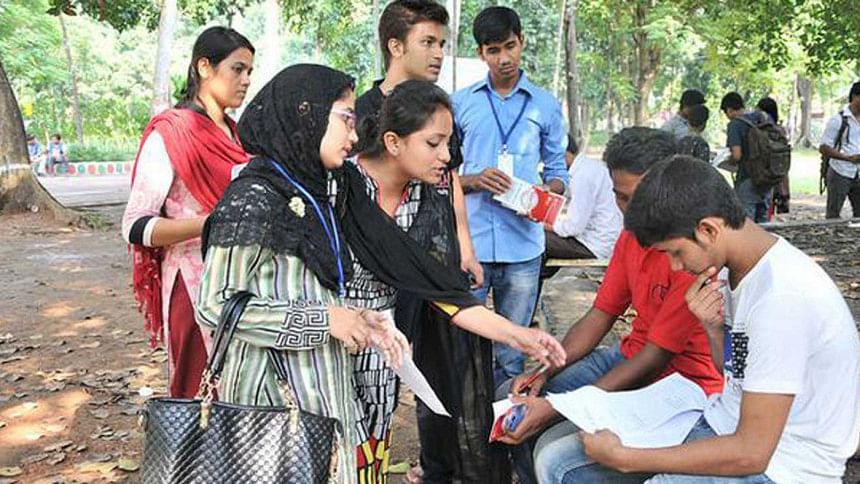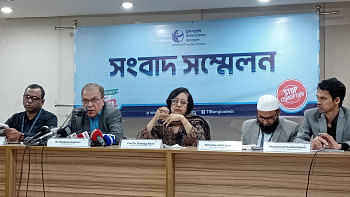Tap into youth potential

INTERNATIONAL Youth Day (IYD), commemorated on the 12th of August every year, gives an opportunity to celebrate young peoples' views and initiatives. It recognizes the importance of youth participation in political, economic and social life. This year, 16 years after the (IYD) was first declared by the UN General Assembly, we have all the more reason to celebrate youth and their role in political, economic and social development – both globally and in Bangladesh.
Globally, the youth population, those between the ages of 15-24 is 1.2 billion strong in 2015. In Bangladesh, if we look at the same age group, it is approximately 29 million strong. If we apply the Bangladesh definition of youth, those between the ages of 18-35, the figure is at a staggering 52+ million youth. This is more than the entire population of some countries and it is one which presents Bangladesh with a tremendous opportunity to ensure the country's overall development. This opportunity, however, will be realised only if the Government of Bangladesh makes the right investments, especially in health, education, skills development and employment generation for its adolescent and youth population. To reap the benefits coming from having a young population the country needs to equip youth with the appropriate set of skills to participate in the labour market and trigger innovation and development in the country.
Youth Civic Engagement is one of the main goals of the United Nations System-Wide Action Plan on Youth, and the UN, seeks to promote young people's effective inclusive civic engagement at all levels. It is important to note there is increasing attention and policy and programming focus on youth civic engagement by governments, UN entities, regional and multilateral organizations, CSOs, youth and researchers. Globally youth movements and student groups are becoming increasingly involved in governance structures, policy planning, community mobilisation and national programme implementation efforts. What is more important, however, is that they are challenging traditional power structures and calling for their engagement in decisions which will, in the long term, affect their lives. There is however still a long way to go: only 1.6 per cent of parliamentarians worldwide are young people, most of whom are men. Young people rarely join political parties, and the majority do not vote in elections. Young people need to be provided with opportunities to fulfil their potential. To achieve this young people's rights need to be recognized and granted, including the right to accurate information and services also in relation to sexuality and reproductive health. Only if they are empowered with knowledge and skills to protect themselves and make informed decisions, they can realize their full potential and contribute to economic and social transformation. Special attention needs to be paid to adolescent girls as they are often burdened by child marriage, sexual violence and unplanned pregnancies, preventing their full civic engagement.
Youth are a force for change and they are asserting themselves as agents and partners, with powerful voices in the public – be it in Bangladesh or elsewhere. It is important to appreciate the fresh ideas and proactive roles youth have played in development processes and, as we get closer to the finalisation of the Sustainable Development Goals, ensure youth are empowered and their capacities strengthened to participate in civic life, claim their rights and realise their aspirations in the new development agenda.
***
International Youth Day 2015: Youth Civic Engagement
What is Youth Civic Engagement? It is a process through which youth are provided with opportunities to engage in democracy, social and political issues, governance structures and community mobilisation – so that they can become agents of change and valuable resources who can contribute to the overall development of their community.
Recognizing the importance of youth:
In order to recognize the role youth can play in achieving long-term social change in Bangladesh and the importance of their engagement in civic life, the United Nations, established a UN Youth Advisory Panel (UNYAP) in July 2014. This group of highly talented youth, consisting of 26 Bangladeshis from all parts of the country, represent 19 networks linked to the development sector and civil society organizations. The UNYAP is a structured mechanism from which youth can voice their opinions and viewpoints on development matters relevant to their lives and communities. They support UN agencies in their work by providing a youth perspective and bringing in fresh and innovative ideas that can be used by the UN. The UN supports these young people, for example, by inviting them to policy development platforms, linking them with training opportunities and exposing them to international youth conferences.
Source: UNFPA.

 For all latest news, follow The Daily Star's Google News channel.
For all latest news, follow The Daily Star's Google News channel. 



Comments